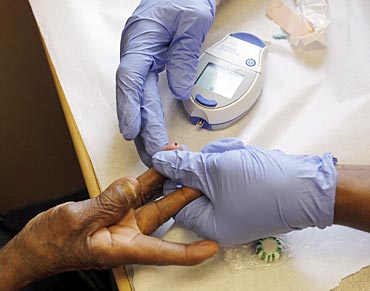
It's time we stopped thinking that it always happens to someone else -- the statistics prove otherwise.
We are progressing. Our economy, infrastructure and standard of living are all on the rise and along with them, lifestyle-related diseases are also surging -- diabetes is one of them.
India: Diabetes capital of the world
In a shocking revelation from the International Diabetes Federation (IDF), India is the diabetes capital of the world, home to 50.8 million people suffering from the condition, of which 50 percent are unaware of it. IDF, which tracks the global spread of this scourge, predicts the number is expected to go up to a whopping 87 million -- 8.4 percent of the country's adult population -- by 2030.
These inglorious numbers will be achieved quite easily, simply by keeping up with our new hectic, erratic, urban 'modern lifestyle'. And the section of population most affected by it is the youth.
For a given body mass index, Indians have a higher percentage of fat and more visceral fat than members of other populations, putting us at a higher risk of lifestyle diseases. In fact, a recent programme for early detection of diabetes conducted at corporate offices showed that among individuals with risk factors for diabetes aged between 25 and 35, more than 60 percent had pre-diabetes and diabetes.
Sheryl Salis is Head of Patient Care at 'Cheeny Kum', the first real-time disease management technology for diabetes.
Illustration: Uttam Ghosh

Causes
A sedentary lifestyle consisting of long working hours and lack of physical exercise also takes its toll. No matter what your job profile, every profession is stressful in its own way and requires an average of 10-12 hours of your time daily, leaving no time and willingness to exercise. Also, the advent of televisions, computers and other technological sources of entertainment has done its share of harm to young minds and bodies.
Today's youngsters prefer slouching in front of their TV/computer screens in their air-conditioned rooms, munching on a packet of chips rather than involving themselves in any outdoor activities. This has turned the once-active man into a modern, lazy and dependent-on-machines couch potato. Our 24x7 routines have made stress and anxiety a part of our daily lives, thus leading to this disorder.
Illustration: Uttam Ghosh

Impact upon the youth
It is recommended that all Indians above the age of 25 get themselves screened for diabetes at least once a year, especially if risk factors like obesity, a family history of diabetes, stress and physical inactivity exist. Diagnosis involves a non-invasive test, which tells you your risk of developing diabetes, metabolic disorders and its associated complications. One such machine currently in use is the EZ scan, which detects your chances of diabetes and its complications in the near future.
Diabetes is one of many lifestyle diseases that has the youth of today firmly within its grasp. Not easily detectable, most of these conditions are insidious in nature. They gradually develop over the years and can cause serious complications even in the pre-diabetic/borderline stage. Just a small lifestyle change can go a long way in reversing pre-diabetes and controlling diabetes.

Symptoms
The most prominent symptoms of diabetes are increased thirst, hunger, frequent urination and blurred vision, but the fact remains that the most common symptom is that there is none -- it is often detected only when people go for their annual medical check-ups, during pre-surgery fitness tests, when creating a health insurance policy or when one lands up with a diabetes complication.
Illustration: Uttam Ghosh

Effects of diabetes
The effects of diabetes, as expected, are grave and include heart and blood circulation diseases, kidney and vision problems, skin diseases etc. Along with physical ill effects, type-2 diabetes also breeds some very grave psychological and social concerns. A person diagnosed with type-2 diabetes is naturally stressed and worried. Stress leads to depression and depression in turn takes its toll on the victim's self-esteem and performance levels. In a nutshell, the approach to life is completely toppled by this dreaded disorder. Diabetes education, which includes counselling about the disorder, its management and lifestyle modifications is the standard form of treatment in advanced countries and although it is the need of the hour here in India, it is sadly missing.
Since there is no cure for diabetes, the only way to deal with it is prevention and if that fails, you have to establish complete control over the disorder. A patient needs to adapt to healthy lifestyle choices and constantly maintain glucose levels in the body, blood pressure and cholesterol levels as close to normal as possible. Doing so may help prevent or delay diabetes-related problems affecting the heart, feet, eyes and kidneys. This takes on even more importance when you consider the age factor -- the young need to maintain a healthy lifestyle to be able to live with the disorder for another couple of decades.
To keep your heart strong and healthy, opt for a complete cholesterol check-up. Regular exercise and eating a diet that is lower in saturated fats and refined carbohydrates and high in fibre is the order of the day. According to the American Heart Association, people who smoke are at twice the risk of a heart attack and so it's important for diabetes patients to quit smoking.

Type 2 diabetes
Type 2 diabetes was hitherto common over the age of 40. However, in recent times a very high number of individuals between 20-40 have been exhibiting the clinical features of type 2 diabetes. The main causes of type 2 diabetes are a sedentary lifestyle, unhealthy eating practices, stress, alcohol, smoking, anxiety, genetics and irregular visits to the doctor, thus leading to further complications.
It is extremely important to keep in touch with your doctor at regular intervals. However, due to a fear of hospitals/doctors/medication and the high cost factor involved, people visit their doctors only once in awhile. In most cases, a doctor is consulted only when the condition of a patient has already worsened and little can be done to reverse the harm caused. To avoid this, it is important that blood sugar is monitored on an everyday basis, diet is altered according to the readings and proper medication is administered. It is extremely important to maintain blood sugar levels in the safe zone consistently, if diabetes is to be controlled.
One must also monitor one's eating habits and eat 'right', without which it is impossible to curb diabetes. In today's fast-paced world, dependency on packaged foods such as chips, burgers, pizzas, colas, pastas etc has increased manifold owing to busy schedules -- most youngsters hardly have the time to eat their meals at home.

Keeping diabetes at bay
Considering this alarming state of affairs, follow the guidelines below to keep diabetes at bay: